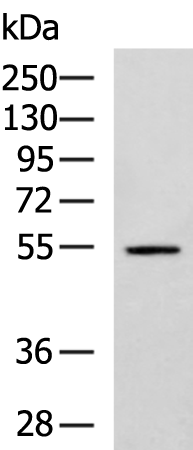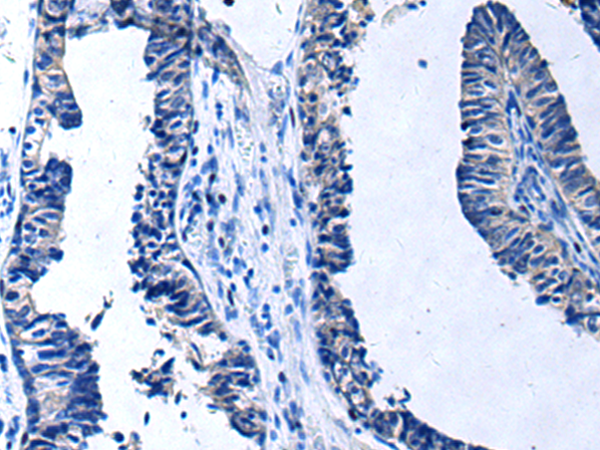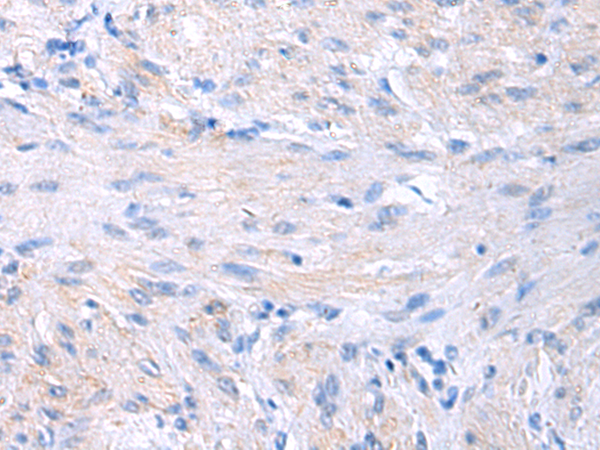


| WB | 咨询技术 | Human,Mouse,Rat |
| IF | 咨询技术 | Human,Mouse,Rat |
| IHC | 1/50-1/100 | Human,Mouse,Rat |
| ICC | 技术咨询 | Human,Mouse,Rat |
| FCM | 咨询技术 | Human,Mouse,Rat |
| Elisa | 1/5000-1/10000 | Human,Mouse,Rat |
| Aliases | PC; APC; PROC1; THPH3; THPH4 |
| WB Predicted band size | 52 kDa |
| Host/Isotype | Rabbit IgG |
| Antibody Type | Primary antibody |
| Storage | Store at 4°C short term. Aliquot and store at -20°C long term. Avoid freeze/thaw cycles. |
| Species Reactivity | Human |
| Immunogen | Synthetic peptide of human PROC |
| Formulation | Purified antibody in PBS with 0.05% sodium azide and 50% glycerol. |
+ +
以下是关于PROC(蛋白C)抗体的3篇参考文献及其摘要概括:
---
1. **标题**:*"Acquired protein C deficiency caused by autoantibodies: a case report and literature review"*
**作者**:Uthman I, et al.
**摘要**:报道一例因抗蛋白C自身抗体导致的获得性蛋白C缺乏症,分析其与反复静脉血栓形成的关联,并综述此类自身抗体在血栓性疾病中的潜在机制。
2. **标题**:*"Autoantibodies against protein C in a patient with systemic lupus erythematosus"*
**作者**:Kizilocak H, et al.
**摘要**:描述一名系统性红斑狼疮(SLE)患儿体内检测到抗蛋白C自身抗体,探讨其与儿童SLE患者高凝状态及血栓并发症的相关性。
3. **标题**:*"Monoclonal antibodies targeting protein C for functional characterization in coagulation assays"*
**作者**:Rezaie AR.
**摘要**:研究开发针对蛋白C的单克隆抗体,用于体外凝血功能检测,验证其在蛋白C活性测定及遗传性/获得性缺乏症诊断中的应用价值。
---
**备注**:PROC抗体研究多聚焦于两类方向——
1. **自身免疫性抗体**(如抗磷脂综合征、SLE等疾病中出现的病理性抗体,干扰蛋白C抗凝功能);
2. **工具性抗体**(实验室用于检测蛋白C水平或功能的中和抗体)。上述文献涵盖临床案例及实验方法学,可供进一步研究方向参考。
PROC antibodies target protein C, a vitamin K-dependent glycoprotein synthesized in the liver and crucial for regulating blood coagulation. Protein C, when activated by thrombin-thrombomodulin complexes, becomes activated protein C (APC), which inactivates coagulation factors Va and VIIIa, thereby inhibiting excessive clot formation and promoting fibrinolysis. PROC antibodies are associated with acquired protein C deficiency, often linked to autoimmune conditions, infections, or malignancies. These autoantibodies may neutralize protein C’s activity or accelerate its clearance, leading to a hypercoagulable state.
Clinically, PROC antibody-related disorders manifest as recurrent venous thromboembolism (e.g., deep vein thrombosis, pulmonary embolism) or purpura fulminans in severe cases. They are frequently observed in autoimmune diseases like antiphospholipid syndrome (APS) or systemic lupus erythematosus (SLE). Detection involves immunoassays to identify antibodies and functional tests to assess protein C activity. Management includes anticoagulation (e.g., heparin, direct oral anticoagulants) and immunosuppressive therapies to address underlying autoimmune triggers. Research continues to clarify the pathogenic mechanisms and optimize diagnostic and therapeutic strategies for these rare but potentially life-threatening conditions.
×